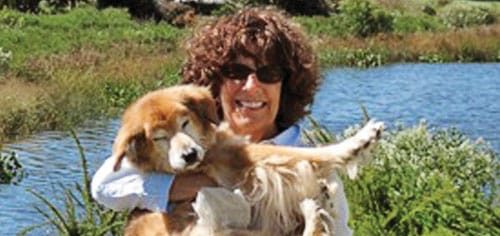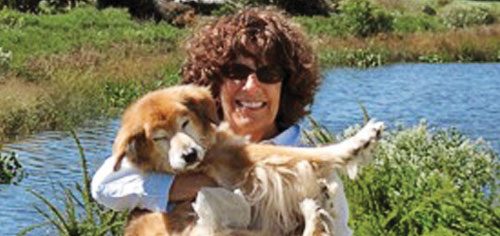

Last Lick: How I met my dog
Tribute to an Old Dog
It’s four in the morning and cold and dark and quiet. I am
sprawled on the family room carpet in flannel pajamas stroking
my dog, Buddy. He now sleeps on the first floor because he
can no longer climb steps. Sometimes—more and more now—
he may awaken in the early morning hours, and I will hear his
whimper and the sound of his nails pacing on the hardwood
floors in the hallway below. That’s when I slip out
of bed and into my robe and pad downstairs.
My reward is Buddy’s low groan of contentment,
the soft warmth of his fur
nuzzling against my heart, his paw
curling under his neck as he falls
back to sleep.
I do this because Buddy is very
old. He was 19 on March 1, and
my husband and I are pretty
sure this will be his final year. I
also do this because I love this
little creature with an intensity
that sometimes surprises me.
Buddy is a rather odd-looking
“mutt” with Golden Retriever coloring,
a German Shepherd-like muzzle,
and a bushy tail. He is about 17 inches tall
and weighs 23 pounds, down from his earlier
weight of 35. With his thick fur and lumbering walk,
he resembles a caramel-coloured bear cub.
Due to advanced age, Buddy’s hearing loss is almost complete,
and his eyes are cloudy with cataracts. He is sometimes
disoriented, staring for long periods at nothing in particular. His
hind legs are weak, and he has difficulty navigating even the
single step on our front porch. He startles easily.
We adopted Buddy from a local shelter almost 16 years ago
when he was already three years old. He had a few behaviour
issues; while Buddy was lovable and loyal with us, he was
sometimes unpredictable with others. He had an aversion to
squirrels, most other dogs, many children, and some men. I
would walk him warily, alert for anything that could provoke
incessant barking and pulling. But old age has mellowed Buddy.
He is now too frail to cause a ruckus. His walks around the
block are slow and tentative. Sometimes, he may allow a very
brief nose rub from Molly, a frisky yellow Lab who treats Buddy
with tenderness, perhaps sensing his age. He has become the
grand old dog of the neighborhood: a little dotty, but regarded
with affection and some curiousity.
Despite Buddy’s age and ailments, there is still life in the old
guy. His appetite is healthy. Although almost deaf, Buddy somehow
knows when the refrigerator door opens and he
waits for a handout. And when we ask, in a
loud and lilting pitch, “do you want to go
for a walk?” his tail wags and there is a
bounce to his gait.
Some time this year, we expect
that Buddy will let us know that
we need to let him go. He will
let us know when he is in pain,
and when he no longer wants to
walk or munch on refrigerator
treats. He will tell us when these
small but significant joys pale
in comparison to his infirmities.
When that time comes, we will say
goodbye to our dear and constant
friend.
My husband and I will grieve and we
will miss Buddy deeply. But we also know
that when you love a dog, you must come to terms
with loss. We accept this as a small price to pay for the years of
devotion he has freely given us.
Much has been written about the human-animal bond, and
the role that animals play in our lives, their loyalty, companionship,
support, and, sometimes, heroism. Our pets also fill
an important need for connection with something beyond the
minutia of our daily lives. They lift our spirits. They fill us with
grace.
I am moved by a comment made by Chief Seattle when faced
with the loss of his tribe’s land more than 100 years ago. He
said, “What is man without the beasts? If all the beasts were
gone, man would die from a great loneliness of spirit. For whatever
happens to the beasts, soon happens to man. All things are
connected.”
Email submissions for Last Lick to lastlick@moderndogmagazine.com
For more information on rights and regulations for submissions click here
Join the newsletter and never miss out on dog content again!
"*" indicates required fields
By clicking the arrow, you agree to our web Terms of Use and Privacy & Cookie Policy. Easy unsubscribe links are provided in every email.